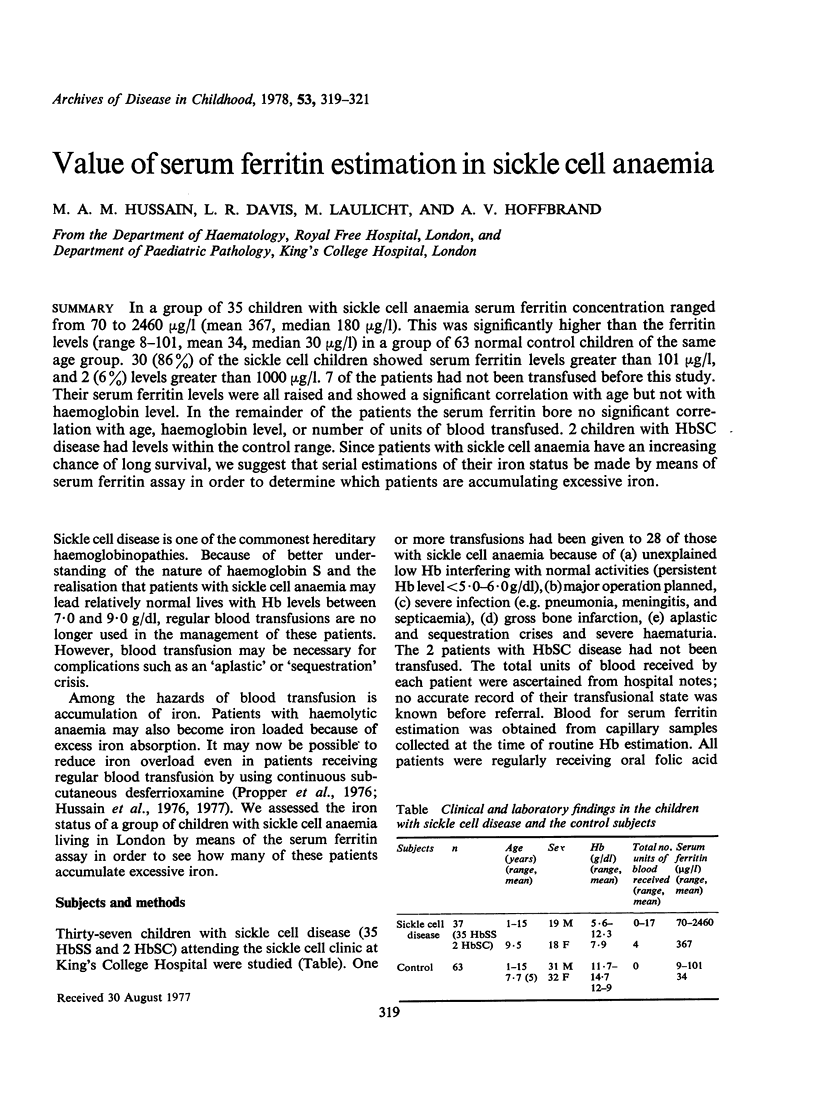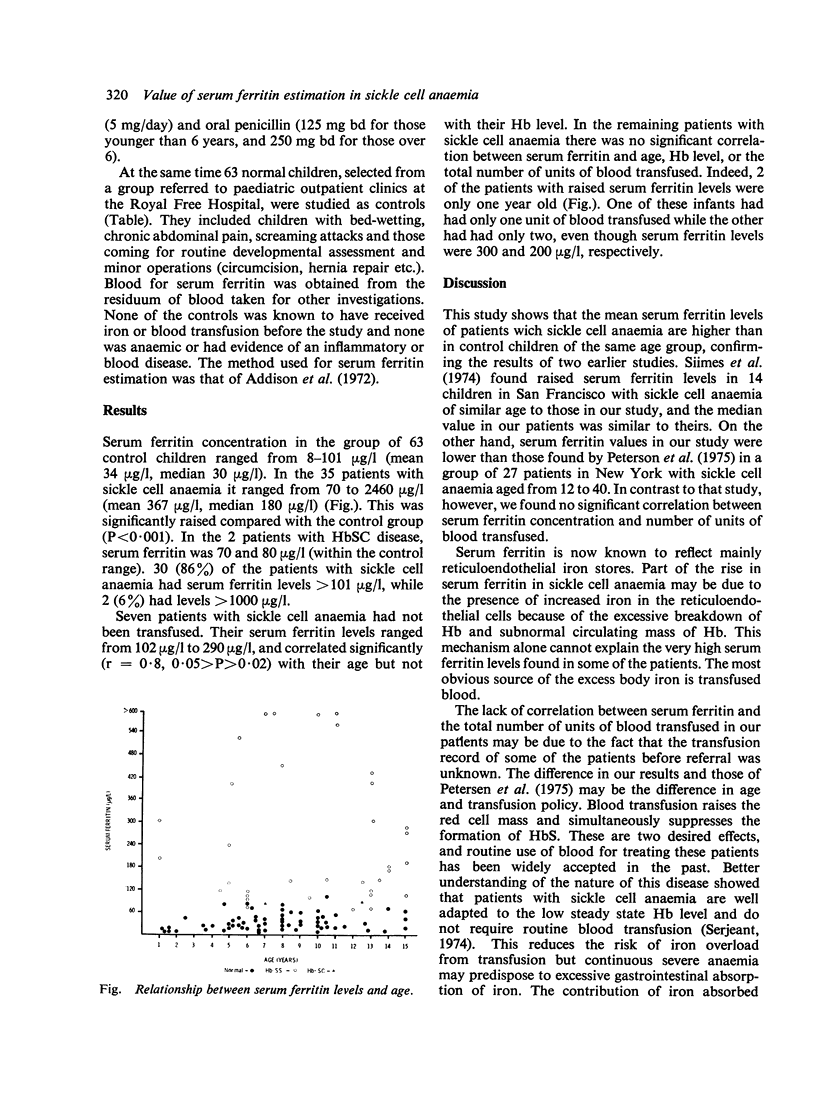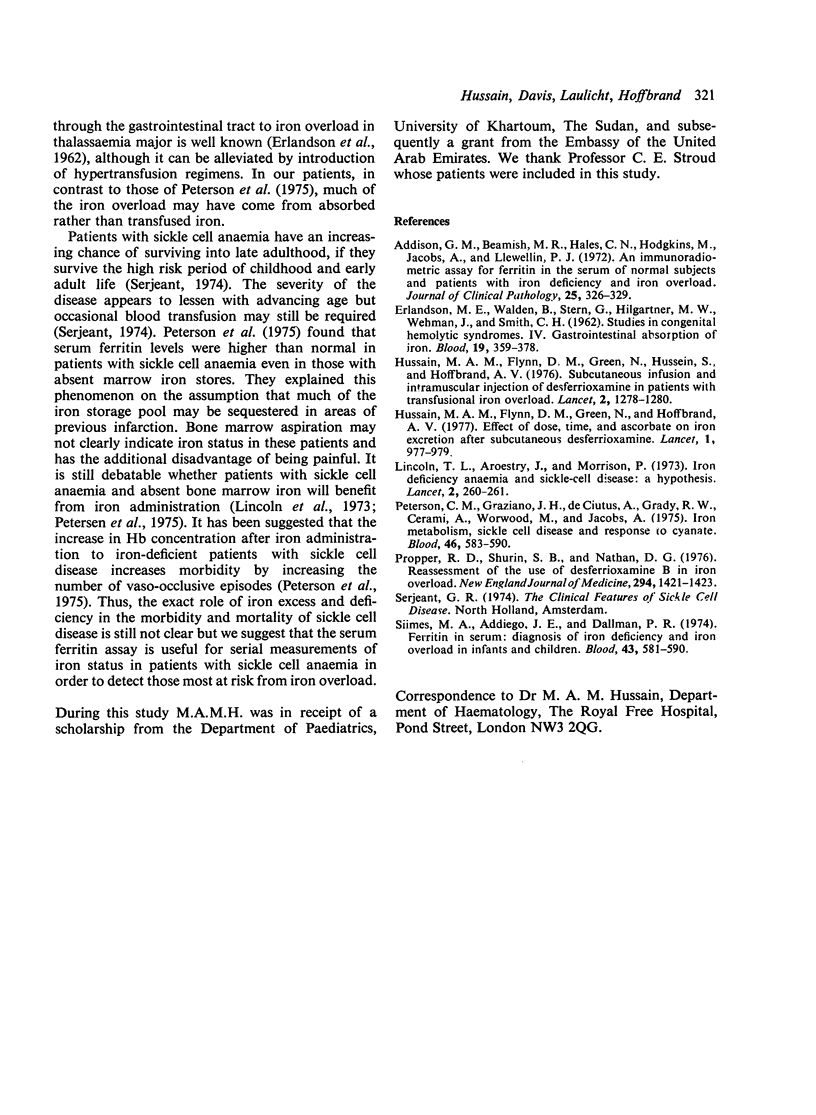Abstract
In a group of 35 children with sickle cell anaemia serum ferritin concentration ranged from 70 to 2460 microgram/l (mean 367, median 180 microgram/l). This was significantly higher than the ferritin levels (range 8-101, mean 34, median 30 microgram/l) in a group of 63 normal control children of the same age group. 30 (86%) of the sickle cell children showed serum ferritin levels greater than 101 microgram/l, and 2 (6%) levels greater than 1000 microgram/l. 7 of the patients had not been transfused before this study. Their serum ferritin levels were all raised and showed a significant correlation with age but not with haemoglobin level. In the remainder of the patients the serum ferritin bore no significant correlation with age, haemoglobin level, or number of units of blood transfused. 2 children with HbSC disease had levels within the control range. Since patients with sickle cell anaemia have an increasing chance of long survival, we suggest that serial estimations of their iron status be made by means of serum ferritin assay in order to determine which patients are accumulating excessive iron.
Full text
PDF


Selected References
These references are in PubMed. This may not be the complete list of references from this article.
- Addison G. M., Beamish M. R., Hales C. N., Hodgkins M., Jacobs A., Llewellin P. An immunoradiometric assay for ferritin in the serum of normal subjects and patients with iron deficiency and iron overload. J Clin Pathol. 1972 Apr;25(4):326–329. doi: 10.1136/jcp.25.4.326. [DOI] [PMC free article] [PubMed] [Google Scholar]
- ERLANDSON M. E., WALDEN B., STERN G., HILGARTNER M. W., WEHMAN J., SMITH C. H. Studies on congenital hemolytic syndromes, IV. Gastrointestinal absorption of iron. Blood. 1962 Mar;19:359–378. [PubMed] [Google Scholar]
- Hussain M. A., Green N., Flynn D. M., Hoffbrand A. V. Effect of dose, time, and ascorbate on iron excretion after subcutaneous desferrioxamine. Lancet. 1977 May 7;1(8019):977–979. doi: 10.1016/s0140-6736(77)92279-6. [DOI] [PubMed] [Google Scholar]
- Hussain M. A., Green N., Flynn D. M., Hussein S., Hoffbrand A. V. Subcutaneous infusion and intramuscular injection of desferrioxamine in patients with transfusional iron overload. Lancet. 1976 Dec 11;2(7998):1278–1280. doi: 10.1016/s0140-6736(76)92035-3. [DOI] [PubMed] [Google Scholar]
- Lincoln T. L., Aroesty J., Morrison P. Iron-deficiency anemia and sickle-cell disease: a hypothesis. Lancet. 1973 Aug 4;2(7823):260–261. doi: 10.1016/s0140-6736(73)93163-2. [DOI] [PubMed] [Google Scholar]
- Peterson C. M., Graziano J. H., de Ciutiis A., Grady R. W., Cerami A., Worwood M., Jacobs A. Iron metabolism, sickle cell disease, and response to cyanate. Blood. 1975 Oct;46(4):583–590. [PubMed] [Google Scholar]
- Propper R. D., Shurin S. B., Nathan D. G. Reassessment of the use of desferrioxamine B in iron overload. N Engl J Med. 1976 Jun 24;294(26):1421–1423. doi: 10.1056/NEJM197606242942603. [DOI] [PubMed] [Google Scholar]
- Siimes M. A., Addiego J. E., Jr, Dallman P. R. Ferritin in serum: diagnosis of iron deficiency and iron overload in infants and children. Blood. 1974 Apr;43(4):581–590. [PubMed] [Google Scholar]


